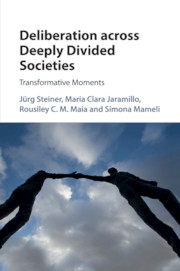Crossref Citations
This Book has been
cited by the following publications. This list is generated based on data provided by Crossref.
Kim, Nuri
Fishkin, James S
and
Luskin, Robert C
2018.
Intergroup Contact in Deliberative Contexts: Evidence From Deliberative Polls.
Journal of Communication,
Vol. 68,
Issue. 6,
p.
1029.
Maia, Rousiley C M
Cal, Danila
Oliveira, Vanessa V
Vimieiro, Ana Carolina
Hauber, Gabriella
and
Rossini, Patrícia G C
2018.
Deliberation Across a Space of Reasons: Assessing Epistemic Changes in Group Discussions.
Human Communication Research,
Vol. 44,
Issue. 4,
p.
399.
Restrepo, Elvira María
2018.
Online Technology as a Pathway for Citizen Deliberation and Depolarization.
Perspectives on Global Development and Technology,
Vol. 17,
Issue. 3,
p.
239.
Curato, Nicole
Hammond, Marit
and
Min, John B.
2019.
Power in Deliberative Democracy.
p.
173.
Curato, Nicole
Hammond, Marit
and
Min, John B.
2019.
Power in Deliberative Democracy.
p.
61.
Dryzek, John S.
Bowman, Quinlan
Kuyper, Jonathan
Pickering, Jonathan
Sass, Jensen
and
Stevenson, Hayley
2019.
Deliberative Global Governance.
Johnson, N. F.
Manrique, P.
Zheng, M.
Cao, Z.
Botero, J.
Huang, S.
Aden, N.
Song, C.
Leady, J.
Velasquez, N.
and
Restrepo, E. M.
2019.
Emergent dynamics of extremes in a population driven by common information sources and new social media algorithms.
Scientific Reports,
Vol. 9,
Issue. 1,
Pitasse Fragoso, Katarina
and
Lippmann, Pedro
2020.
Poverty, Inequality and the Critical Theory of Recognition.
Vol. 3,
Issue. ,
p.
261.
Alnemr, Nardine
Choucair, Thais
and
Curato, Nicole
2020.
Can the poor exercise deliberative agency in a multimedia saturated society? Lessons from Brazil and Lebanon.
Political Research Exchange,
Vol. 2,
Issue. 1,
p.
1802206.
Lukianova, Ekaterina
and
Steffensmeier, Timothy
2020.
“Well, in the case of my mom…”.
Journal of Argumentation in Context,
Vol. 9,
Issue. 3,
p.
315.
Kapiszewski, Diana
and
Karcher, Sebastian
2021.
Transparency in Practice in Qualitative Research.
PS: Political Science & Politics,
Vol. 54,
Issue. 2,
p.
285.
Curato, Nicole
Sass, Jensen
Ercan, Selen A
and
Niemeyer, Simon
2022.
Deliberative democracy in the age of serial crisis.
International Political Science Review,
Vol. 43,
Issue. 1,
p.
55.
Bowman, Quinlan
2022.
Re-Engaging Normative and Empirical Democratic Theory: Or, Why Normative Democratic Theory Is Empirical All the Way Down.
Critical Review,
Vol. 34,
Issue. 2,
p.
159.
Barbabela, Pedro
and
Villalba, Yulieth Martínez
2022.
Reflections on listening and democracy: women’s and feminist organizations in the Victims’ Forums in Colombia (2014).
International Feminist Journal of Politics,
Vol. 24,
Issue. 1,
p.
111.
Soc, Andrija
2022.
From deliberation to participation: Democratic commitments and the paradox of voting.
Filozofija i drustvo,
Vol. 33,
Issue. 1,
p.
98.
Jakob, Julia
2022.
The interplay of personal storytelling with rational justifications in online discussions: A qualitative exploration of news user comments.
Javnost - The Public,
Vol. 29,
Issue. 4,
p.
403.
Miklikowska, Marta
Rekker, Roderik
and
Kudrnac, Ales
2022.
A Little More Conversation A Little Less Prejudice: The Role of Classroom Political Discussions for Youth’s Attitudes toward Immigrants.
Political Communication,
Vol. 39,
Issue. 3,
p.
405.
Popescu, Diana Elena
2022.
Symmetry and interpretation: a deliberative framework for judging recognition claims.
Critical Review of International Social and Political Philosophy,
p.
1.
Pitasse Fragoso, Katarina
2022.
Telling a story in a deliberation: addressing epistemic injustice and the exclusion of indigenous groups in public decision-making.
Journal of Global Ethics,
Vol. 18,
Issue. 3,
p.
368.
Maia, Rousiley C. M.
Hauber, Gabriella
and
Choucair, Tariq
2023.
The Deliberative System and Inter-Connected Media in Times of Uncertainty.
p.
29.





